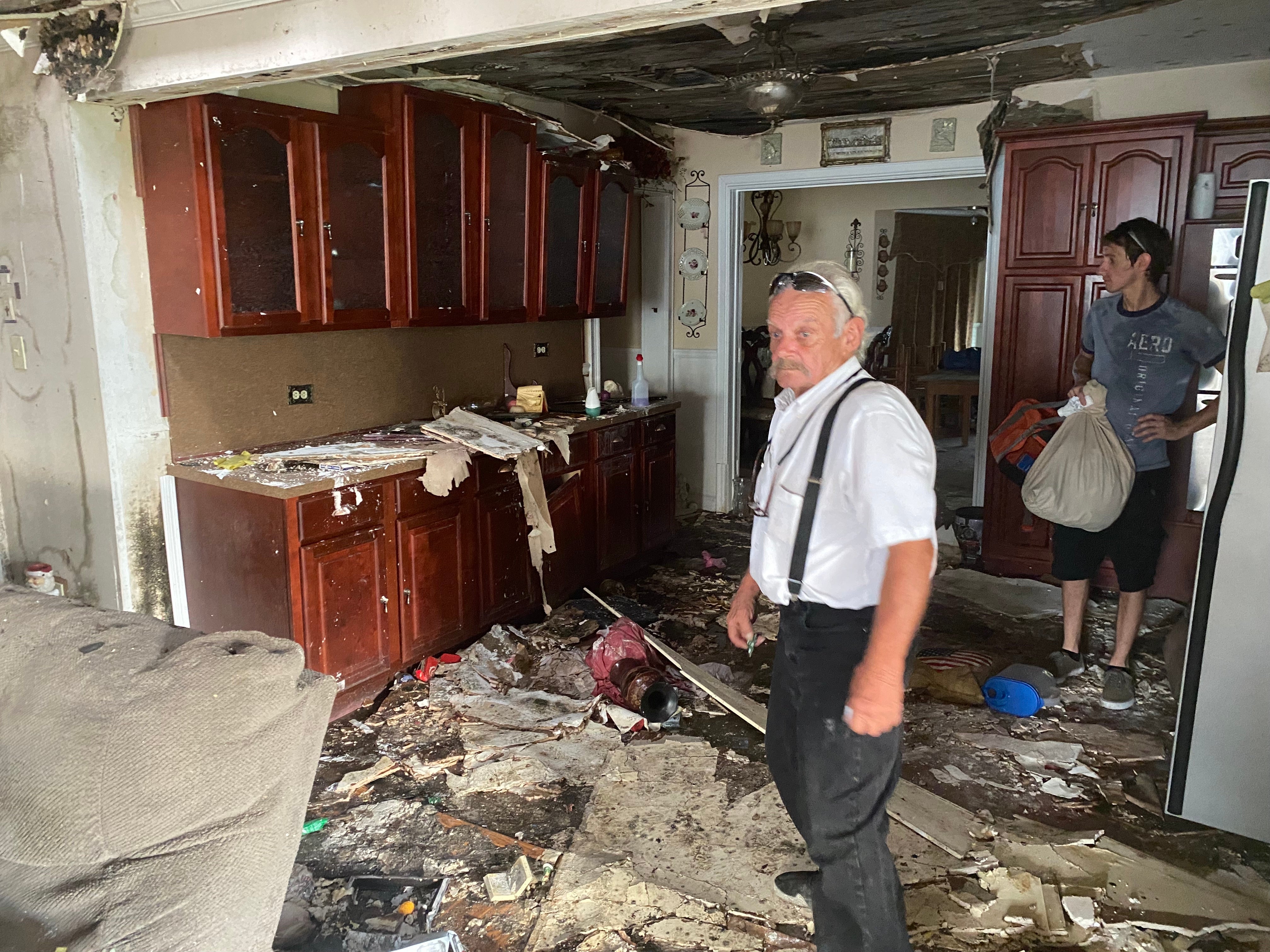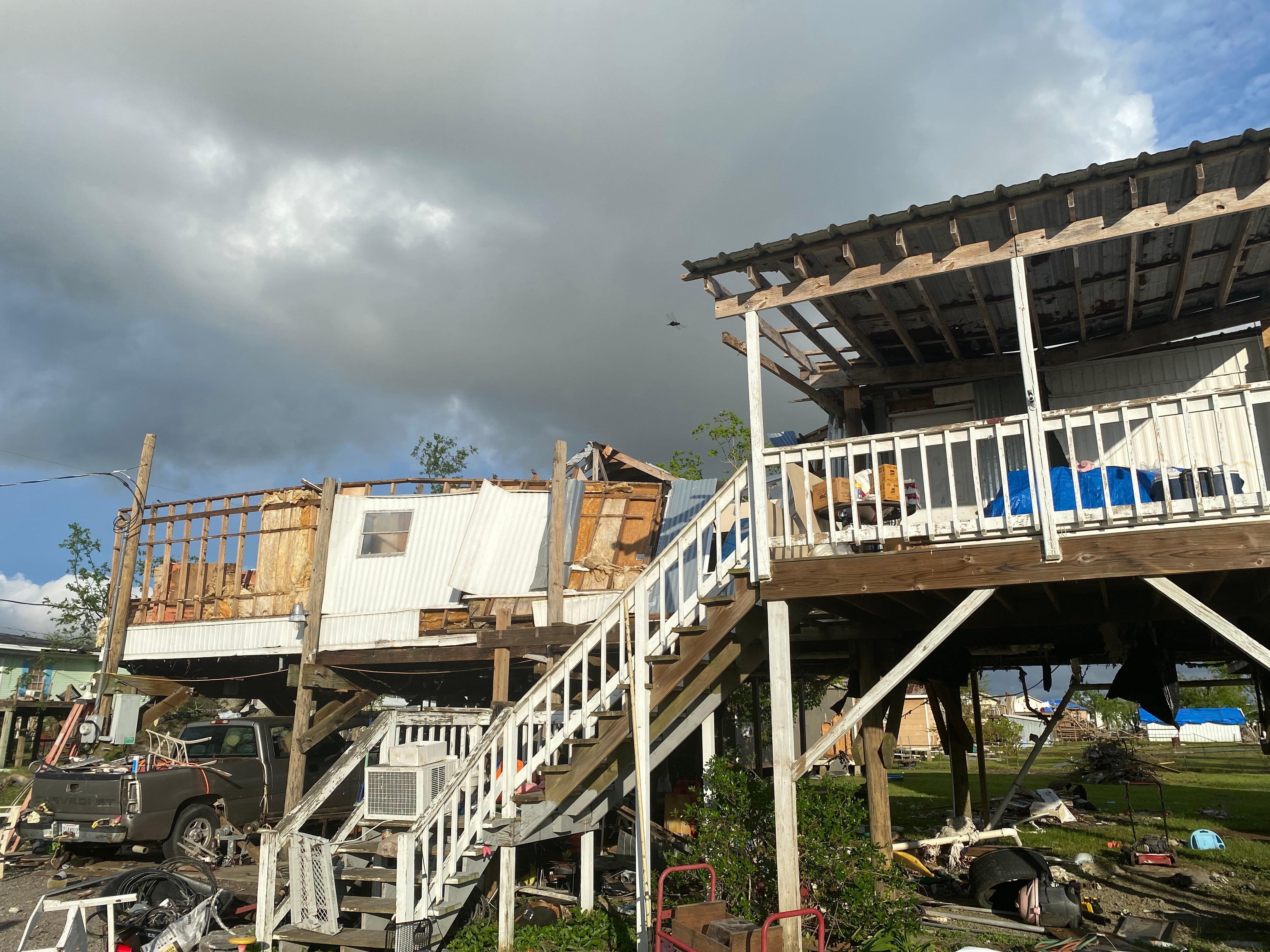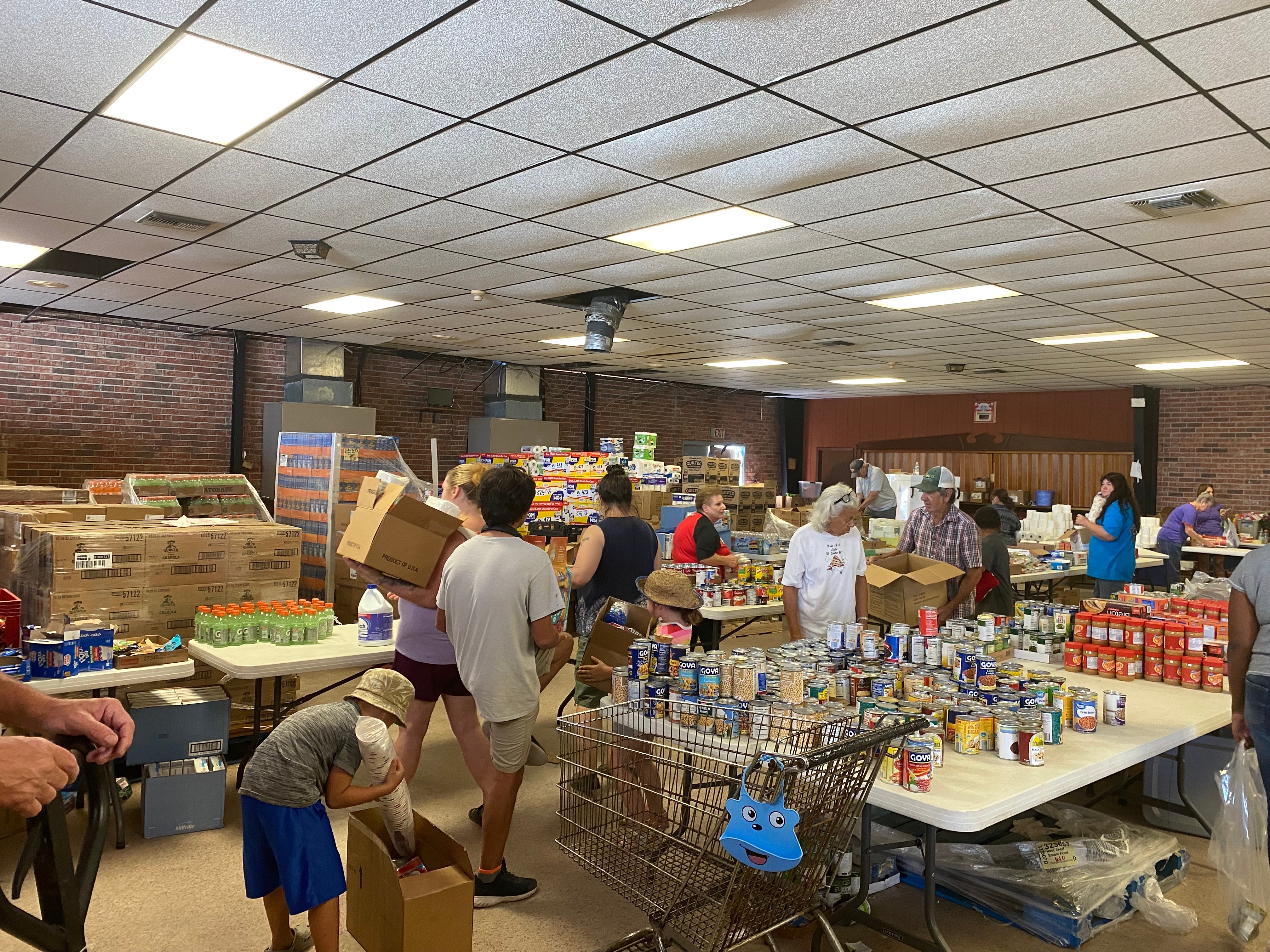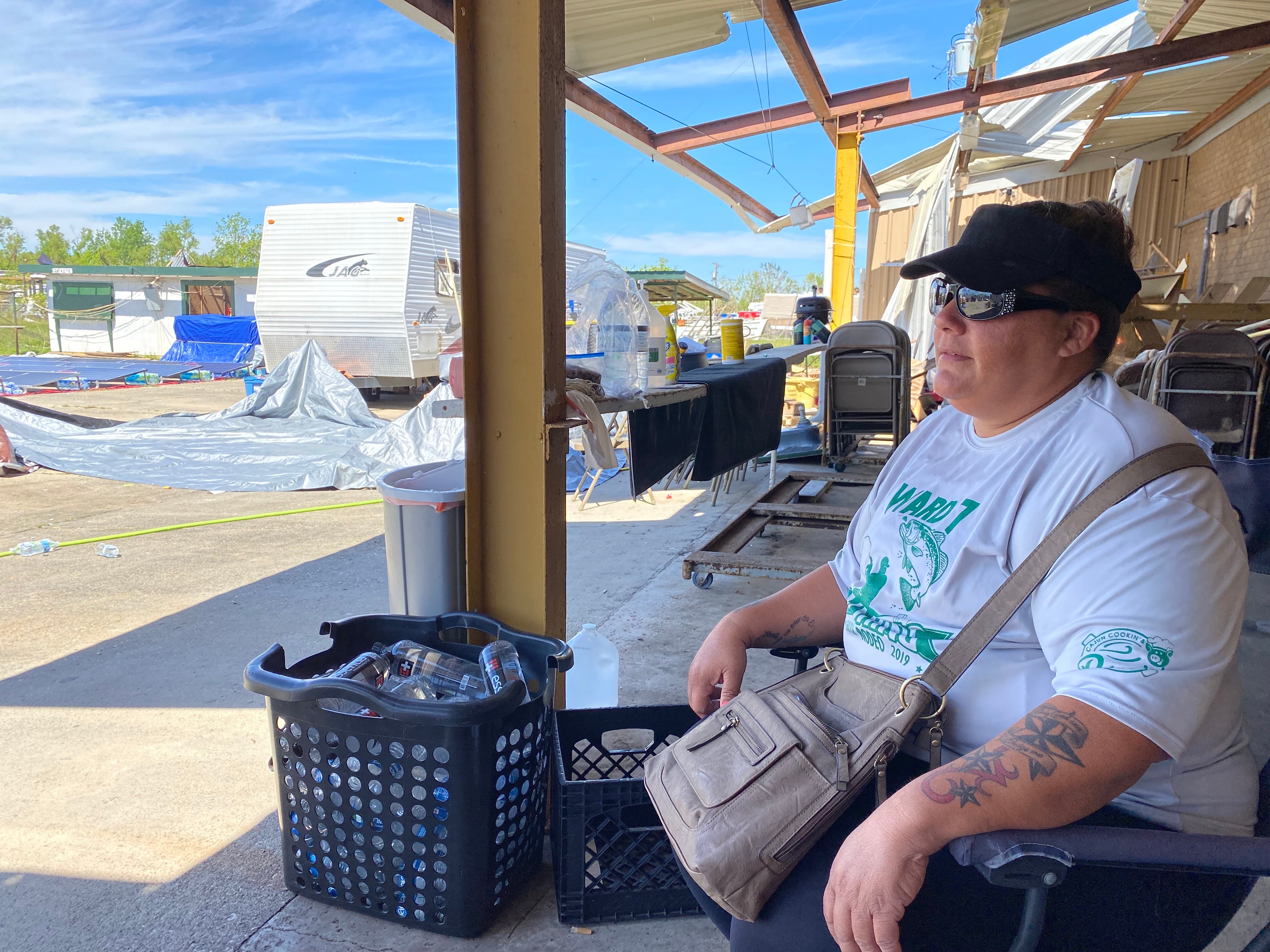‘Like it’s never going to end’: Louisiana coast faces housing crisis after Hurricane Ida ripped apart homes
Thousands of residents living in tents, cars, campers and moulding homes still seek urgent federal aid one month after the storm, Alex Woodward reports


Kassy James rakes debris outside her mother-in-law’s home in Chauvin, Louisiana nearly one month after Hurricane Ida destroyed most of the homes on their street.
“I don’t even know what day it is sometimes,” she says. “When is it gonna end, you know? Pray for better days. That’s all you can do.”
After Ida ripped apart her home on 29 August, Ms James now shares the small apartment in the backyard with her mother-in-law, fiance, and four children, including a one-month-old.
A tent she received from a nearby emergency supply centre is now her safest shelter.
“It feels impossible sometimes, like it’s never going to end,” she says.
Next door, Durle Blanchard treads through pieces of ceiling that collapsed into his home, where mould and mildew have taken over walls and what’s left of the ceiling after Ida lifted his roof, now stacked in a mound of debris on the other side of the street. His home is among thousands covered with a temporary tarp to keep out the rain.
A snowman decoration, among the last pieces of his family’s Christmas village to survive the storm, is propped against a fence near a sign reading “Don’t Take! We Lost Enough.”
Mr Blanchard – who has lived in his home for nearly 40 years – raised the building several feet after flooding from Hurricane Rita in 2005. Hurricane Gustav ripped off his roof in 2008.
“Now this one came, it took the whole roof off,” he says. “Everything – every room is damaged. I can’t live like that.”
FEMA denied Mr Blanchard temporary housing and personal property coverage because he has home insurance, though his insurance company told FEMA that his plan does not include housing, he said. He can’t move into a hotel or shelter in another state – he needs to be able to get to work, and he needs to stay close to home so he can start cleaning, ripping out sheetrock and salvaging what he can before he rebuilds.
By the end of the week, he hopes to buy a camper he can park in his driveway for him and his wife, son and two grandchildren.
“The only thing we need is a house. That’s it,” he says. “I don’t need new clothes. I can go buy new clothes. I can go buy me a lot of stuff we need. … It’s not our first rodeo, but this was the worst we’d ever seen.”

Stories like theirs are in the thousands in Terrebonne Parish and across the state. For at least 30 miles along Highway 56, from Houma to Chauvin and Cocodrie, and along the surrounding streets, the insides of gutted homes fill the shoulders of the road.
Insulation and sheetrock, refrigerators, wooden cabinets, mattresses and couches are heaped by piles of collected tree branches and whole trees that tractors have pulled to the curb. Strips of metal roofs – torn apart by powerful winds – curl above hundreds of homes.
Officials estimate 13,000 homes in Terrebonne were destroyed, and roughly 60 per cent of everything below the intracoastal canal approaching the Gulf of Mexico is uninhabitable.
The familiar sight of blue-tarped roofs has returned across south Louisiana, from New Orleans and its surrounding suburbs to homes left standing at the state’s remote points near the Gulf.
The growing climate crisis has warmed the Gulf, fuelling stronger storms that tear into a Louisiana coastline eroded by rising waters and an oil and gas industry that has carved into critical wetlands that provide a natural protective barrier.
Some homes appear split in two. Many have completely collapsed, exposing a still-standing refrigerator or stove inside. The damage is overwhelming, touching hundreds of miles of the state, with increasing devastation the further south one goes.
Residents are living in tents, trailers and campers, or in their moulding, storm-damaged homes, relying on their cars for air-conditioning and to charge their phones.
Drivers honk and wave at utility trucks and cherrypickers repairing thousands of miles of power lines, and electricity and running water are slowly returning to homes in harder-hit parts of the state, but residents are not able to live inside them.
Many landlords have also effectively evicted people in apartment buildings after catastrophic damage to their properties, according to officials.
A vast network for mutual aid groups, faith-based organisations and volunteers filling cargo vans with food and supplies was on the ground days before government agencies headed to impacted areas.
“If people could spend a day, or even just somehow get an idea of how people are being forced to live right now, in these coastal communities that got hit, it would blow their minds,” says Louis Michot of the band Lost Bayou Ramblers. Mr Michot has helped organise supply runs and food distribution across the state.
“They would not think this is America,” he tells The Independent. “People living in their houses and trailers that lost their roofs, that are soaked, that are mouldy – they’re still getting water in their house, they’re sleeping on the floor, because all their bedding and linens are mouldy, and they don’t have the resources to just go buy everything new right now. They barely have enough gas to get to the gas station.”
Officials in Terrebonne Parish have requested 10,000 trailers from FEMA for residents whose homes are unliveable. None have been delivered.
FEMA has paid for hotel rooms for roughly 3,200 households in Terrebonne and Lafourche parishes, according to the agency, but residents and state and local officials have grown frustrated with the agency’s response and lack of a clear timetable for more immediate housing needs.
Officials have demanded that the federal agency do more to stem the growing housing crisis, confirming their long-held suspicions that the federal government – which they believe has neglected or abused the largely lower-income bayou communities for decades – has abandoned them.
State Representative Tanner Magee, whose district includes Terrebonne and Lafourche parishes, has urged Governor John Bel Edwards for help, warning of a mounting humanitarian crisis.
“These citizens, along with all who advocate for an end to their plight, are crying out for a basic human need: Safe and decent housing,” he wrote in a letter to the governor. “These Louisiana citizens urgently need some form of housing that is safer and more secure than a tent or a partly sheltered area of a decimated structure that was once a home.”
In a statement on Twitter, he was even more direct: “There’s only one conclusion that can be reached from [FEMA’s] continued inaction – it’s on purpose.”
“They act like an insurance company, delaying their response to drive down the costs as people get frustrated and move on,” he added. “It’s easy when you’re the bureaucrat not sleeping in a tent.”
FEMA has approved more than 500,000 requests for relief sending $639m “in grants directly to survivors in Louisiana,” as of 28 September, the agency said in a statement. That includes $112.4m in grants to people living in Terrebonne and Lafourche parishes, according to the agency.
The agency is urging impacted residents to “utilize the assistance currently being provided to them which may include transitional sheltering assistance, and rental assistance which is money to temporarily rent housing, such as a house, apartment, or a hotel or motel room while repairs are being made to their primary residence.”
Short-term housing aid includes financial help for basic repairs and rental assistance to help people relocate.
One FEMA official told CBS News that trailers may not be available for residents until November.
In Metairie, a suburb of New Orleans, a sign above Interstate 10 reads “NO FEMA ROOMS, NOT AVAILABLE.”

Keisha Foret tells a woman inside the Ward 7 Citizens Club on Highway 56 to “go get you a box and start shopping.”
The building has been transformed into a food bank and supply centre, where residents can fill cardboard boxes with diapers and baby food, canned goods, cleaning supplies, clothing and medicine. Supplies are coming in by the truckloads.
American Red Cross vans and US Army National Guard service members distribute hot meals, water and ice in the parking lot. Doctors and nurses with Southeast Louisiana Medical Mutual Aid set up a clinic to help fill prescriptions and provide care.
Ms Foret, a past club president, helped open the building two days after the storm.
“The day after the storm someone was reaching out on Facebook trying to find someone to open,” she says. “Nobody was responding, so I just commented on it and said, ‘Yes, y’all can use the building, yes, y’all can use the property,’ and I really don’t care who got something to say about it. This organisation is for the citizens.”

She relies on volunteers and help from friends and family to sort through donations and distribute supplies – it’s tiresome work, but it’s a welcome distraction. Ms Foret now lives in a camper in the rear parking lot of the building after Ida destroyed her home in Chauvin. Her mobile home was too old to be insured, she says.
“I just try to stay busy. I’m going to eventually have to face what’s next – where I’m going to go, what I’m going to do, what steps we gotta take,” she says. “I really don’t have time to focus, sit down and stay on the phone and kind of just wait to hear from FEMA. … I just can’t find it in me to close these doors, as long as I know the need is needed, I just can’t. I’m collecting my little $200 on unemployment. It’s all I can do.”
Join our commenting forum
Join thought-provoking conversations, follow other Independent readers and see their replies
Comments
Bookmark popover
Removed from bookmarks